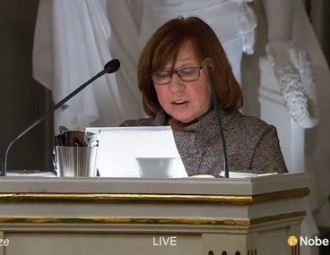Sviatlana Alexievich: The dictatorship is primitive, as a rule, dictators are foolish people

Belarusian writer who won the 2015 Nobel Prize in Literature gave a press conference in the Swedish Academy in Stockholm.
Having been asked what helps her continue her work, continue to write books, Sviatlana Alexievich answered that “life is very interesting. I have never set a goal to win the Nobel Prize. I just wanted to understand who we are, why we live, why people suffer again”.
Remembering her childhood, Alexievich said that when she was 10 years old and her grandmother got a pension, the woman kissed the money and cried.
“I wanted to find out why people are good, but their life is bad and write about it,” – she added.
The Nobel laureate believes the Belarusian village to be the symbol of the country, because “on the one hand it is the basis, and on the other it is incapable of reform”.
“I’m looking for the truth. It is of high importance to comprehend Russia’s new Middle Ages period”.
According to Alexievich, “troubled time” have come to Russia again, since the reaction of the Russian authorities is very aggressive, and the Russians themselves are very happy about the country’s aggression.
Asked about her favorite books, Alexievich says that they were ‘her main wealth’ when she was a child. She recalls Belarusian writer Ales Adamovich as one of her favourite authors.
“There is not enough space for the truth in the heart. It is necessary to collect the stories of several people to see a big picture,” Belsat quotes Sviatlana Alexievich saying about her method of work.
When asked why her new book is devoted to love, Alexievich says that love needs effort through one’s whole life. A human being is not born to die on the Chernobyl reactor or in Donbas, she says.
“I have written all I knew about the Red man,” Alexievich tells about her latest book Second-hand Time. “I hope we understand that if we gain freedom, we can avoid slavery. When I finished the book, I wondered what the Earth still revolves around? And the answer was ‘around love and death’. Now I am writing a book in which both men and women tell about love. If I am up for it, later I will write a book about old age and death”.
“I like the ‘Russian world’ of Tolstoy, Dostoyevsky, not that of Putin and Shoigu,” Sviatlana Alexievich said.
It is very easy to wage a war, Sviatlana Alexievich believes. “One can send a detachment of soldiers [to Belarus], as it happened in Donbas, and set Poles and Belarusians on themselves,” said the writer.
Speaking about the period of “War’s Unwomanly Face” and “Second-hand time”, Sviatlana Alexievich said that when she was writing “War’s Unwomanly Face” she was young, and it took her time to get rid of communist illusions. “The recent book Second-hand time was written by a human being who is free of illusion. And now it is more difficult for me to believe in the person, in the future. I still believe, but not blindly”, - she said.
Let us recall that the Belarusian author Sviatlana Alexievich won the Nobel Prize in Literature 2015 “for her polyphonic writings, a monument to suffering and courage in our time”. The solemn ceremony of awarding the Belarusian writer Sviatlana Alexievich is to be held on December 10 in Stockholm. The amount of the award in 2015 is 8 million Swedish kronor, that is 953,000 US dollars. Alexievich is the 14th woman to get the award in literature in history.
-
03.01
-
07.10
-
22.09
-
17.08
-
12.08
-
30.09



























